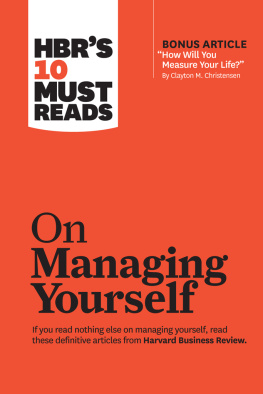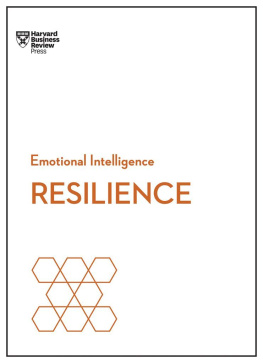HBR Press Quantity Sales Discounts
Harvard Business Review Press titles are available at significant quantity discounts when purchased in bulk for client gifts, sales promotions, and premiums. Special editions, including books with corporate logos, customized covers, and letters from the company or CEO printed in the front matter, as well as excerpts of existing books, can also be created in large quantities for special needs.
For details and discount information for both print and ebook formats, contact .
Copyright 2019 Harvard Business School Publishing Corporation
All rights reserved
Printed in the United States of America
10 9 8 7 6 5 4 3 2 1
No part of this publication may be reproduced, stored in or introduced into a retrieval system, or transmitted, in any form, or by any means (electronic, mechanical, photocopying, recording, or otherwise), without the prior permission of the publisher. Requests for permission should be directed to , or mailed to Permissions, Harvard Business School Publishing, 60 Harvard Way, Boston, Massachusetts 02163.
The web addresses referenced in this book were live and correct at the time of the books publication but may be subject to change.
Library of Congress Cataloging-in-Publication Data
Title: Mindful listening.
Other titles: HBR emotional intelligence series.
Description: Boston, Massachusetts : Harvard Business Review Press, [2019] | Series: HBR emotional intelligence series | Includes index.
Identitiers: LCCN 2018044757 | ISBN 9781633696679 (pbk.)
Subjects: LSCH: Listening. | Mindful (Psychology) | Listening comprehension. | Emotional intelligence. | Communication in management. | Leadership. | Industrial management.
Classification: LCC BF323.L5 M56 2019 | DDC 153.6/8dc 23
LC record available at https://lccn.loc.gov/2018044757
ISBN: 978-1-63369-667-9
eISBN: 978-1-63369-668-6
The paper used in this publication meets the requirements of the American National Standard for Permanence of Paper for Publications and Documents in Libraries and Archives Z39.48-1992.
Contents
They amplify, energize, and clarify your thinking.
By Jack Zenger and Joseph Folkman
Break down your internal barriers.
By Amy Jen Su and Muriel Maignan Wilkins
How your emotions affect what you hear.
By Ralph G. Nichols and Leonard A. Stevens
See things from their point of view.
By Christine M. Riordan
Be mindful of where your attention is.
By Rasmus Hougaard and Jacqueline Carter
Help others share at a deeper level.
An interview with Mark Goulston by Sarah Green Carmichael
Put your convictions aside and learn what motivates others.
By Nilofer Merchant
Nurture the relationship when listening isnt enough.
By Ron Friedman
Hear out your employees before giving feedback.
By Guy Itzchakov and Avraham N. (Avi) Kluger
Are your productivity and mental health at risk?
By Sandra L. Robinson and Kira Schabram
When to listen to your inner criticand when not to.
By Peter Bregman
Mindful Listening
HBR EMOTIONAL INTELLIGENCE SERIES
1
What Great Listeners Actually Do
By Jack Zenger and Joseph Folkman
C hances are you think youre a good listener. Peoples appraisal of their listening ability is much like their assessment of their driving skills, in that the great bulk of adults think theyre above average.
In our experience, most people think good listening comes down to doing three things:
- Not talking when others are speaking
- Letting others know youre listening through facial expressions and verbal sounds (mm-hmm)
- Being able to repeat what others have said, practically word-for-word
In fact, much management advice on listening suggests doing these very things: encouraging listeners to remain quiet, nod and mm-hmm encouragingly, and then repeat back to the talker something like, So, let me make sure I understand. What youre saying is... However, recent research that we conducted suggests that these behaviors fall far short of describing good listening skills.
We analyzed data describing the behavior of 3,492 participants in a development program designed to help managers become better coaches. As part of this program, managers coaching skills were assessed by others in 360-degree assessments. We identified those who were perceived as being the most effective listeners (the top 5%). We then compared the best listeners to the average of all other people in the data set and identified the 20 items that showed the largest significant difference. With those results in hand we identified the differences between great and average listeners and analyzed the data to determine what characteristics their colleagues identified as the behaviors that made them outstanding listeners.
We found some surprising conclusions, along with some qualities we expected to hear. We grouped them into four main findings:
- Good listening is much more than being silent while the other person talks. To the contrary, people perceive the best listeners to be those who periodically ask questions that promote discovery and insight. These questions gently challenge old assumptions but do so in a constructive way. Sitting there silently nodding does not provide sure evidence that a person is listening, but asking a good question tells the speaker the listener has not only heard what was said but that they comprehended it well enough to want additional information. Good listening was consistently seen as a two-way dialogue, rather than a one-way speaker versus hearer interaction. The best conversations were active.
- Good listening includes interactions that build a persons self-esteem. The best listeners made the conversation a positive experience for the other party; that doesnt happen when the listener is passive (or, for that matter, critical). Good listeners made the other person feel supported and conveyed confidence in them. Good listening was characterized by the creation of a safe environment in which issues and differences could be discussed openly.
- Good listening is seen as a cooperative conversation. In these interactions, feedback flowed smoothly in both directions with neither party becoming defensive about comments the other made. By contrast, poor listeners were seen as competitiveas listening only to identify errors in reasoning or logic, using their silence as a chance to prepare their next response. That might make you an excellent debater, but it doesnt make you a good listener. Good listeners may challenge assumptions and disagree, but the person being listened to feels the listener is trying to help, not trying to win an argument.











